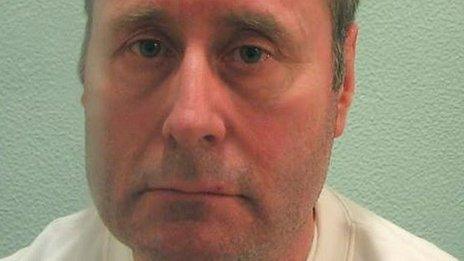Taxi sex attacks: John Worboys' victims win payout bid
- Published

John Worboys was jailed in 2009 for a string of sex attacks on women in his taxi
Two women who were sexually assaulted by London taxi driver John Worboys have won their High Court bid to get compensation from the Met Police.
The women claimed their treatment by police after reporting Worboys's attacks had caused mental suffering.
The judge ruled their human rights were breached. Damages will now be assessed.
The judge also said "systemic" failures in the investigation meant Worboys - jailed for life in 2009 for attacks from 2002-08 - was not stopped earlier.
Reacting to the judgement, the Met said the case raised "important arguments regarding the boundaries of police responsibility", adding that it had already apologised for mistakes in the investigation.
It said many of the judge's criticisms had already been addressed and that it would now consider the judgement.
Delivering his judgement at the High Court in London, Mr Justice Green said Worboys - who was convicted of 19 offences, including one rape and 12 drugging charges - had carried out more than 100 rapes and sexual assaults.
The women, known only as DSD and NBV for legal reasons, brought their claims under article three of the Human Rights Act - the right not to be subjected to torture or to inhuman or degrading treatment.
DSD's 2003 allegation against Worboys was the first received by the Met - although a woman went to City of London Police the previous year.
NBV contacted the police after being attacked by Worboys in July 2007.
DSD said she suffered a depressive disorder as a result of her treatment by officers during the 2003 investigation, while NBV claimed that she suffered serious distress, anxiety, guilt and an exacerbation of a post-traumatic disorder and depression as a result of her treatment in 2007.
The judge said there had been a "series of systemic failings" by the Met, which had failed to "cut short [Worboys'] five to six-year spree of violent attacks".
He said the Met had failed to "join the dots" between various attacks despite the fact a "common modus operandi" was used by Worboys.
DSD told the BBC the police were "good" to start with, but soon officers made it clear they did not believe her.
She said she refused to collect her clothes, which were taken as evidence, when police closed the case.
"I did say to them 'you're going to need these because he will strike again. You've made this crime so easy for him'."
She also said no-one had taken Worboys's details when he dropped her unconscious at a police station.
Harriet Wistrich: "Had the police done their job properly, probably a lot of women would not have been raped"
Harriet Wistrich, solicitor for the two women, said the judgement was of "great significance" because it was the first in the High Court to find that such failings by the police "can give rise" to successful legal action.
She said that, during the case, the police had "questioned whether they have a duty at all towards victims under law" and the judgement made it clear they did have such a duty.
"Had the police done their job properly, probably a lot of women wouldn't have been raped, which is really appalling," she said.
She said the judge had identified five main areas of failure by the police - training, supervision, use of intelligence, systems to ensure victim confidence and allocation of adequate resources.
Ms Wistrich said the police had appropriate policies and guidance in place, but that was not "translated on to the ground".
The Met said it did not contest the case due to "factual differences" with the women - but rather on the "interpretation of European human rights law".
"The case has raised important arguments regarding the boundaries of police responsibility and liability and we believed that it was important for these principles to be tested before the courts," a Met statement said.
It said it had "previously apologised for mistakes" in the Worboys investigation, adding that the errors were "very much historic".
"In the interim we have made important and significant changes to the way we investigate rape, which remains one of the most challenging and complex policing issues," it added.
- Published28 February 2014
- Published13 December 2012
- Published25 June 2012
- Published25 April 2012
- Published24 April 2012
- Published24 April 2012
- Published26 October 2010
- Published15 June 2010